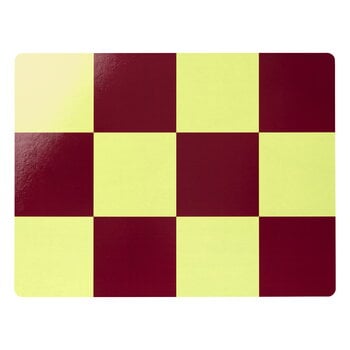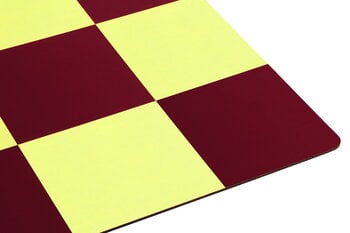Hem's Check tray brings pleasing graphic shapes and sleek lines to the table, no matter if you are enjoying breakfast or hosting a dinner party. Designed by Arthur Arbesser, the table tray is adorned with a classic checkerboard pattern in delicious yellow and burgundy shades. The pattern is printed on a fibreboard, which is then laminated and UV-lacquered – making the surface resistant to time and use, but also extremely easy to keep clean.
Check placemat, 2 pcs, butter - burgundy
Hem
Description
Hem's Check tray brings pleasing graphic shapes and sleek lines to the table, no matter if you are enjoying breakfast or hosting a dinner party. Designed by Arthur Arbesser, the table tray is adorned with a classic checkerboard pattern in delicious yellow and burgundy shades. The pattern is printed on a fibreboard, which is then laminated and UV-lacquered – making the surface resistant to time and use, but also extremely easy to keep clean.
Product details (7)
- Material
- Eucalyptus fiberboard with a laminated and UV lacquered, printed paper surface. Back: felt.
- Colour
- Yellow, burgundy
- Length
- 30 cm
- Width
- 40 cm
- Height
- 1 cm
- Weight
- 0.7 kg
- Care instructions
- Clean with moist cloth, not running water.
Designer
Arthur Arbesser (born in 1983) is a fashion designer whose work is deeply influenced by his home town, Vienna. Drawing inspiration from the cultural heritage and the architecture of the historical city, Arbesser is most famous for his energetic, graphic patterns that he has designed for numerous design brands, including Swedish Hem. Arbesser graduated in 2005 from Central Saint Martins College in London and has since actively collaborated with brands worldwide. He also launched his own brand of clothing, Arthur Arbesser, in 2013.
View all productsReviews (0)
Sustainability
The Product Sustainability Framework, our criteria of sustainable design, helps you find the most sustainable products in our selection. Read below which sustainability criteria this product has met.
Working conditions & labour 8/9
-
Equal opportunities for all employees
-
Commitment to UN Global Compact, fair compensation for all employees
-
Corporate responsibility requirements defined and communicated for suppliers
-
Systematic work for improved inclusion and well-being in the workplace
-
Transparent supply chain
-
Suppliers' compliance to a code of conduct ensured
-
Compliance to the UN Guiding Principles on Business and Human Rights ensured in the supply chain
-
Support for community involvement in the supply chain
-
Direct suppliers audited and certified
Eco-friendly production 8/9
-
Fair and resource-wise water-use in production
-
No incineration or landfilling of returned items
-
No use of endangered species as materials
-
No direct environmental emissions or waste (excl. GHGs) from production
-
The sustainability of direct suppliers' production is addressed and monitored
-
Production and material sourcing that respect biodiversity, animal rights, and natural ecosystems
-
Material-efficient and ecological packaging
-
No potentially harmful chemicals used in own production
-
Positive impact on nature’s well-being through operations that regenerate natural ecosystems
Climate impact 4/8
-
Company's direct greenhouse gas emissions identified and commitment to reduction
-
Product's carbon impact identified and commitment to reduction
-
Guidance on energy- and eco-efficient use of the product
-
100 % renewable energy in own production and operations
-
Contribution to climate initiatives beyond the brand’s direct operations
-
Low-carbon or compensated transportation
-
Carbon footprint of the product calculated and goals set to reduce it
-
Carbon neutral or carbon negative product
Sustainable materials 5/6
-
Sustainable and long-lasting material choices
-
No harmful or hazardous substances
-
Responsible raw material sourcing and production
-
Materials suited for circularity: monomaterials, recyclable finishings, renewable or recycled contents etc.
-
Ecological materials: natural, biodegradable, recyclable or recycled contents
-
Outstanding materials in terms of innovativeness, responsibility, sustainability and circularity: local production or sourcing, 100 % recycled content, C2C-certification etc.
Circular design 3/5
-
High aesthetic quality promoting long-term use of the product
-
Design for enduring life-long quality
-
Design and support for product maintenance, repair and upgradability
-
Technically durable product design and material choices
-
Innovative circular design solutions: circular service system, resale platform, remanufacturing, collection of used products, etc.
Chat to us online
Please enable functional cookies to use this feature. You can change your cookie settings at any time.







